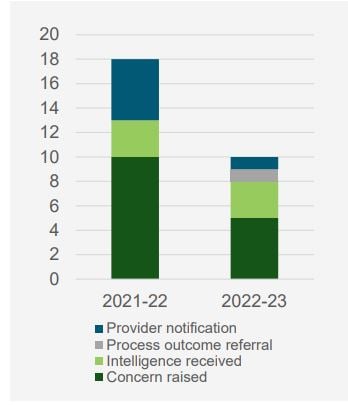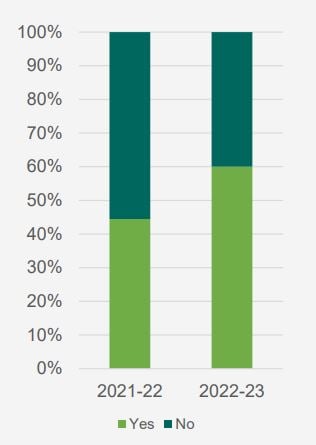We listen to concerns and issues raised to us by external parties, and are able to identify potential issues and concerns ourselves from the data and intelligence we receive.
We consider concerns that might impact how our standards of education and training (SETs) are met, which in turn may affect learners meeting our requirements for registration.
In these situations, we undertake ‘focused review’ assessments, which are focused on the specific concerns raised and whether they could impact on our standards. Through these assessments, we consider the concern itself, ask the education provider for a written response, and will follow up any areas required through quality activities. We will then come to a judgement about whether any further action is required, which can include us setting specific regulatory requirements, or in cases where our standards are no longer met by education providers or programmes, withdraw approval.
Statistics on process application
Source of process trigger
- We trigger focused review assessments from a range of sources, including referrals from our own assessments.
- Most triggers were from concerns raised directly to us – normally these concerns were from learners.
- We require that learners have exhausted internal concerns processes before referring to us, but did not always apply this expectation in the two academic years reviewed.
- As noted in the continuous improvement section, we have established new acceptance criteria for learner concerns, which we have applied from September 2023.

Triage decision – full review required
- When an assessment is triggered, we undertake a triage decision against our standards of acceptance.
- We aim to ensure that our resources are used well, to investigate areas that might impact on our standards being met by education providers and / or programmes.
- We fully investigated about half of the concerns raised to us. We referred the other half back to the person who raised the concern, so they could give the education provider the opportunity to take action locally, or because concerns were outside of our remit. We are confident that education providers have process in place to consider and address concerns, as they align with our standards.
- We investigated one third of referrals from education providers, meaning most referrals did not need to be addressed at the time they were raised. In these cases, we asked that education providers included reflection in their next performance review submission.

Review outcomes
- We decided to take no further action for all but one full review, which was referred to the education provider’s next performance review assessment.
- This did not mean there was nothing to investigate in most cases – rather, we took assurance from education provider responses through assessments that action already taken by the provider had addressed the issue / potential issue.

Themes
Often concerns raised were highly specific to the individual who raised them (rather than a systemic concern). We have picked out four common themes from triggers in the two academic years considered:
- education provider not (or perceived to not) following their own policies or process in specific circumstances;
- allegations by individual learners of discrimination, bullying, and harassment;
- problems with programme delivery, including staff resourcing; or
- quality of practice-based learning, including poor supervision and lack of opportunities to gain competence.
We also considered referrals from the Fitness to Practise team, when an individual involved in an education and training programme was referred through fitness to practise. This enabled us to consider whether there might be impact on our standards of education and training being met, and to ask questions of education providers where required.
